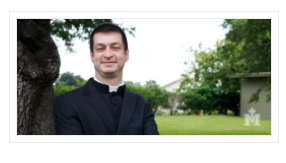Our 4 Pillars
Our school seeks to form our students with 4 pillars. These 4 Pillars were discerned through our rich history, the comments and conversations gathered from our Strategic Visioning, and Church teaching. They also are identified as areas that are increasingly compromised in today’s culture. They are: Wonder, Identity, Community, and Service.
I. Wonder
Human beings, especially small children, never tire of asking why. Apart from our screens, where we are face to face with the natural world and one another, we experience a natural sense of wonder. Our world is literally filled with mysteries – from the study of tiny cells and molecules, to the hundreds of bones and muscles in the human anatomy, to the billions of stars in the night sky, to the satisfaction of a meal over a fire and the joy of a newborn baby. Everything around us is shouting encounter.
With so much in our consumer culture suppressing this natural desire, it is important that our Catholic environment teach others how to see the mystery in every event. This involves intentional time spent outdoors, incorporating more silence into our day, and allowing our curriculum to foster reverence for life and its Creator. For our part, we can begin to foster this already by slowing down to notice the gift of each person and each moment.
II. Identity
Confusion reigns in our world. Young people today are asking “Who am I?” Because of relativism and identity movements, people are losing touch with the beautiful reality of the human person created in God’s image and likeness. But our identity is not something we have to assign to ourselves. It is already stamped in our bodies and souls. We are destined to share in the life of the Most Holy Trinity. And for the baptized, we already belong to God’s family as His adopted sons and daughters.
Included in this pillar are topics like: true vs. false freedom, maximizing your full potential in becoming a saint, connecting to your Father in prayer, among others. St. Paul writes in Romans that “We did not receive a spirit of slavery to fall back into fear, but rather a spirit of adoption in which we cry out, ‘Abba, Father!’” (8:15). Knowing that we belong to a royal family, with all its rights and privileges, is one thing. Knowing that we belong to the family of the God of heaven with all its rights and privileges is a much greater matter.
III. Community
It is not good for man to be alone. If our identity is found in God, then our identity is related to the original communion of persons in God – Father, Son, and Holy Spirit. Even the pre-Christian philosopher Aristotle noticed that human beings were “social animals.” The fact that we live in families, towns, schools, and societies is not something imposed from the outside; rather, it is natural to us.
Community feeds a vital part of us and allows us to flourish properly as human beings. We know that relationships come before work, but too often we get our priorities backward. Modern society constantly encourages this by reducing persons to isolated individuals. Despite millions of people bumping into each other all the time, interaction with each other is breaking down all the time. As an extension of the family, schools are perfect environments to rebuild authentic human community. We can therefore do our part to rebuild by providing space for intentional conversation, small groups, and real recreation.
IV. Service
Part of the fallout from a culture of isolation is self-seeking. Yet this leaves people empty and unfulfilled. St. John Paul II writes that “Man only finds himself by making a sincere gift of himself.” Putting oneself at the service of others and the community leads to real joy, and it creates an environment that attracts others. It’s incredible to watch communities come together in times of disaster or need. In seeing people at their best, we are moved with a sense that this must somehow be a taste of the heavenly kingdom.
As a school, we can be more intentional about the call to serve. Opportunities abound everywhere – from taking care to keep the grounds and common areas clean, to befriending our Transitions students, to assisting at the Sacred Liturgy, to helping the local poor. As Mother Teresa reminds us, the fruit of service is peace. Like the other three pillars, service provides a unique opportunity to encounter Christ hidden in the other. We also find fulfillment by imitating Him, who came “not to be served, but to serve” (Matthew 20:28).
In closing, I again want to draw our attention to the school’s great mascot. We call ourselves “the Saints,” not only because it’s a great Louisiana team name, but because it is our deepest identity and our great “high calling.” Jesus spoke about this call in the Gospel of Matthew: “Be perfect, just as your heavenly Father is perfect” (5:48). This word “perfect” does not mean that we never make mistakes; rather it refers to completion – fulfillment. One rendering of the Latin word perfectum might be “fully cooked.” (There’s another great Louisiana image!) Saints are fully cooked – they have fulfilled their purpose for which God created them.
These four “ingredients” are by no means exhaustive. But I do believe they provide a solid way forward to that goal. Please join me in praying over these pillars and how we as a community can bring them to life at St. Louis Catholic.
–Fr. Nathan Long, Rector
| Sunday | Monday | Tuesday | Wednesday | Thursday | Friday | Saturday |
|---|---|---|---|---|---|---|
|
Athletic Physicals
July 18, 2024
|
||||||
|
Yearbook Distribution for Undergraduates
July 29, 2024 | 10:00 AM - 2:00 PM
|

